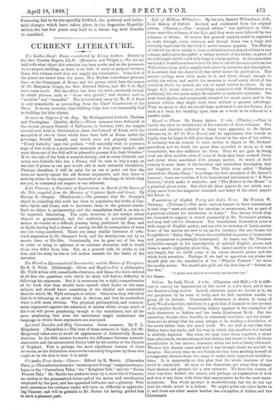Sabina. By Lady Wood. 3 vols. (Chapman and Hall.)—It is
diffi- cult to convey our impressions of this novel in a few lines, yet it does not deserve a long review. Indeed, whatever space we devote to it, we are perplexed by its want of unity, and we find ourselves unable to grasp all its threads. Considerable cleverness is shown in many of Lady Wood's sketches, and there is a good deal of humour in her account of the Quaker family. Something higher appears in the conception of such characters as Sabina and her uncle, Lieutenant Rock. But the execution, though often forcible, is extremely inartistic, and the transi- tions are so abrupt that wo seem always to be reading a description of the novel rather than the novel itself. We are told at one time that Sabina hates her uncle, and the way in which she manifests her hatred is skilfully depicted. But when we next have them together, a short time afterwards, we are informed that Sabina had learnt to love all those peculiarities in her uncle's character which she had so lately abhorred. Whence this change came and how it was brought about we are left to imagine. But every time we see Sabina she has been availing herself of a temporary absence from the stage to make some important modifica- tions. It is apparently on this plan that the whole business of the novel is conducted. As soon as the characters get away they change their dresses and prepare for a new entrance. We have the results of what was done behind the scenes, and perhaps an explanation of how and why it was done, with hints that may prepare us for the next meta- morphosis. The whole product is unsatisfactory, but we do not say that the whole novel is a failure. We might point out other faults in it, and there are other merits besides the conception of Sabina and the Lieutenant.






























 Previous page
Previous page